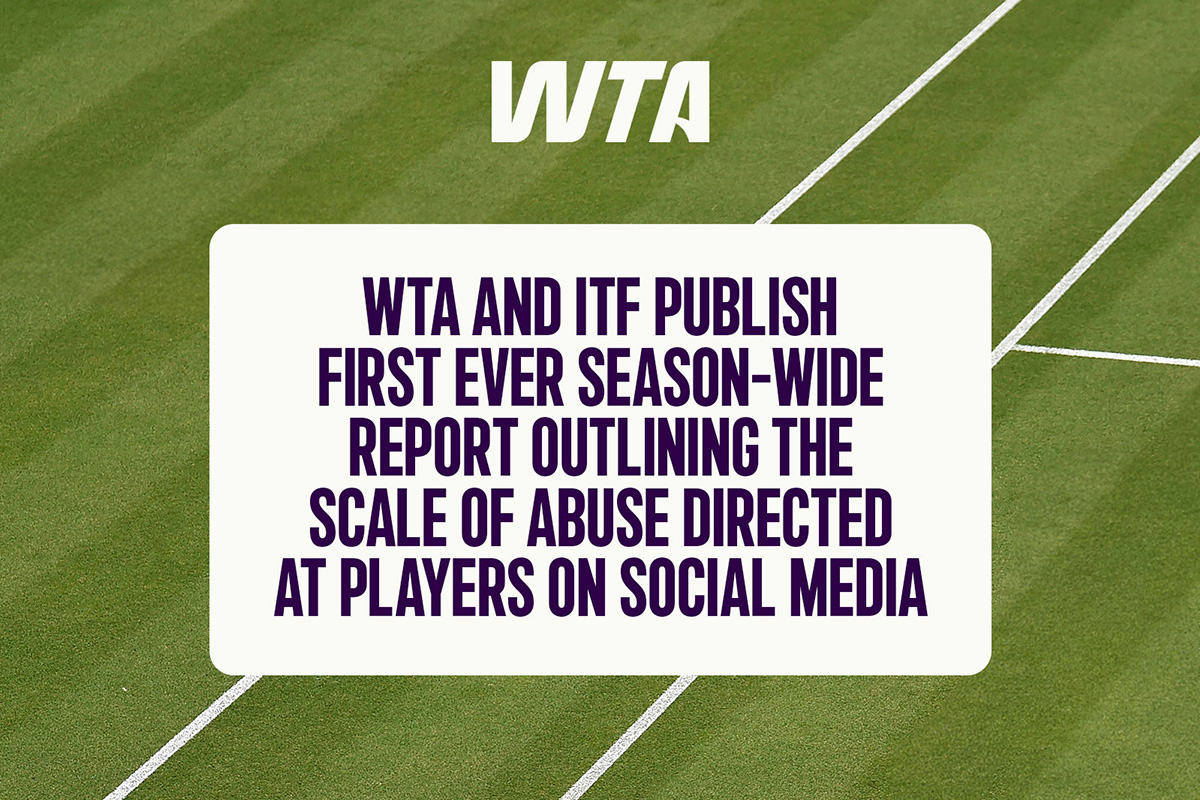Compliance Updates
WTA and ITF Publish Season-wide Online Abuse and Threat Report

The Women’s Tennis Association (WTA) and International Tennis Federation (ITF) published the first-ever season-wide report outlining the scale of abuse directed at players on social media — and are calling on the gambling industry to more effectively tackle those responsible.
The report findings are taken from Signify Group’s Threat Matrix service, which went live in January 2024, protecting players and tennis family members from targeted online hate, as well as threatening and violent direct communication. Utilising AI and human analysts — including risk and fixated threat assessment experts — the service operates across all the major social media platforms in over 40 languages. All players competing in WTA Tour and ITF World Tennis Tour events (and WTA and ITF players competing in the four Grand Slams) — c8300 players — are automatically covered by the service.
Between January to December 2024,1.6 million posts and comments were analysed by Threat Matrix AI. Analysts then verified c8000 posts/comments sent from 4200 accounts as abusive, violent or threatening. Action has been taken against the most serious and prolific of these, including 15 accounts escalated to law enforcement. During the year, 458 players were targeted with direct abuse or threat, five players received 26% of the total abuse identified, while 97 prolific accounts were responsible for 23% of all detected abuse.
Given the evidence highlighted by Threat Matrix, the tennis bodies now call for a constructive dialogue with the gambling industry to tackle the individuals that engage in prolific or highly threatening online abuse connected to sports betting.
Prolific Abuse and Angry Gamblers
• Angry gamblers sent 40% of all detected abuse across the year
• 10 prolific accounts [majority being angry gambler related] were responsible for 12% of all abuse — of these, nine have either been suspended, posts permanently deleted by the platform or the user has removed their post(s)
• Details of 39 account holders (majority angry gambler related) who sent prolific abuse have been shared with the tennis authorities and betting industry for further action
• The most prolific abusive account sent 263 abusive messages.
Action
• 15 cases of egregious and highly threatening abuse have been investigated and evidence provided to law enforcement for assessment and action — four related to Grand Slams, one from the Paris Olympic Games and 10 were from across the tours
• Of the 15 cases, three have been submitted to the FBI and 12 to other national law enforcement bodies
• Relevant account details have been shared with event security teams (both Tours and Grand Slams) to ban these individuals from access to venues and rescind tickets. This has also included threats to men’s and women’s players detected by Threat Matrix during Grand Slam events.
Direct Abuse Communication Support
The Threat Matrix service also includes support for players who receive direct abuse, threat and inappropriate communication via DMs, email and letter. Players use a designated email address to share relevant content, enabling Threat Matrix to conduct threat assessment, provide direct player advice and liaise with security bodies to manage risk.
During 2024, 56 reports of concerning communication were received from 28 players, the vast majority coming in the final quarter of the year due to heightened awareness of the service. Angry gamblers made up the vast majority of direct abuse (77%) — at a higher level compared to open-source social media (40%) — as abusers seek to cause direct emotional distress to players following lost bets. Player reported direct abuse has continued to rise in 2025 as players and agents become more aware of the support service.
Social Media Moderation
To further reduce hateful and abusive content targeting players, the WTA and ITF are also enhancing the existing Threat Matrix service to include social media moderation. Moderation allows online toxicity to be hidden or removed in real time across the majority of Social Media platforms. The service will automatically deploy across WTA and ITF official social media channels and be available to all tour players on request. The service will go live in the coming weeks.
A spokesperson for the WTA and ITF said: “Protecting players and the wider tennis family from vile online threat and abuse is a key priority for us. Today’s report covering the first year of the Threat Matrix service shows the scale of the problem and, crucially, the actions being taken to protect our athletes. From law enforcement escalation and platform intervention to banning abusers from our events, perpetrators must understand that they will face consequences for their actions.
“Given the clear evidence highlighted by Threat Matrix on the link between angry gamblers and prolific online abuse and threat, we are calling for a constructive dialogue with the gambling industry to help tackle this issue. Everyone — betting operators, social media platforms, governing bodies, players and law enforcers — has a responsibility to make the online space a safer and more positive one. We hope the gambling industry responds constructively to our call for more action on their part.”
Jessica Pegula, Member of the WTA Players’ Council, said: “Online abuse is unacceptable, and something that no player should have to endure. I welcome the work that the WTA and ITF are doing with Threat Matrix to identify and take action against the abusers, whose behavior is so often linked to gambling. But it’s not enough on its own. It’s time for the gambling industry and social media companies to tackle the problem at its source and act to protect everyone facing these threats.”
Jonathan Hirshler, CEO of Signify Group, said: “This unique dataset, covering all players across international tennis tours and Grand Slams, illustrates that a relatively small number of accounts are responsible for a significant proportion of prolific abuse and trolling. While this is deeply distressing for the athletes targeted, it means that we are able to be even more focused working with the platforms to ensure successful take down, support the tennis bodies to drive law enforcement intervention for the most egregious accounts and work with event security teams to ensure prolific abusers are unable to attend tournaments. This action-orientated approach underpins the Threat Matrix service.”
The post WTA and ITF Publish Season-wide Online Abuse and Threat Report appeared first on European Gaming Industry News.
California
CGCC Gaming Policy Advisory Committee (GPAC) Meeting: Jan 20, 2026

The California Gambling Control Commission (CGCC) has scheduled a meeting of the Gaming Policy Advisory Committee (GPAC) for 1:00 p.m. on Tuesday, January 20, 2026.
The committee is established under Business and Professions Code Section 19817 to provide advisory recommendations to the Commission on regulatory policy, with a specific focus on integrity and problem gambling.
Meeting Attendance Information
The meeting will be conducted in a hybrid format, allowing for both in-person and remote participation.
-
In-Person Location: 2399 Gateway Oaks Drive, Hearing Room 100, Sacramento, CA 95833.
-
Virtual Access: Zoom Meeting Link
-
Phone Access: 1-888-475-4499 (Toll-free) | Meeting ID: 285 757 8614
Key Agenda Items
The agenda focuses on internal governance, regulatory controls for third-party providers, and administrative updates:
-
GPAC Roles and Responsibilities: A review of the mission statement, adherence to the Bagley-Keene Open Meeting Act, and expectations for member conduct and responsiveness.
-
Current Projects: Update and discussion on Third-Party Providers of Proposition Player Services (TPPPS) – Internal Controls, led by subcommittee members Kirill Yermanov and Michael Hill.
-
New Discussion Items:
-
Third-Party Provider Employee Table Coverage.
-
Procedures for Lost or Damaged Employee Badges.
-
-
Administrative Updates: An update on the Category G vacancy (Public Member with accounting/business background).
2026 Committee Composition
The committee consists of 10 members (expanding to 12 if pending legislation like AB 77 is finalized), split equally between the cardroom industry and the public.
| Member Name | Category / Role | Term Expiry |
| Trevor Dewar | Category A (Bureau of Gambling Control) | 12/31/2026 |
| Sosha Marasigan-Quintero | Category B (Problem Gambling/Addiction) | 12/31/2026 |
| Michael Hill | Category C (TPPPS Representative) | 12/31/2027 |
| David Fried | Category D (Cardroom with 25+ Tables) | 12/31/2026 |
| Michael Koniski | Industry Representative | — |
| Emmanuel Macalino | Industry Representative | — |
| Linda Ng | Public Representative | — |
| John Stacy | Industry Representative | — |
| Kirill Yermanov | Public Representative | — |
Advisors: Lisa Wardall (Executive Director) and Jason Pope (Chief Counsel).
The post CGCC Gaming Policy Advisory Committee (GPAC) Meeting: Jan 20, 2026 appeared first on Americas iGaming & Sports Betting News.
Compliance Updates
Finland’s Gambling Reform Is Official – What Happens Next?

The wait is over: The Finnish Parliament has officially approved the new gambling legislation. In a decisive plenary session, MPs voted 158 in favor to 9 opposed, with 32 abstaining. The text remained unchanged from the version presented in previous weeks, solidifying the framework for Finland’s transition from a monopoly to a licensed market.
With the political uncertainty resolved, the focus now shifts to implementation. For operators, this means the race to compliance—and market entry—has effectively begun.
The Confirmed Timeline

With the legislation passed, the roadmap to the market opening is now set. Operators must use the coming months to prepare for a rigorous licensing process.
-
Early 2026: The application window is expected to open. The regulator will begin accepting and reviewing license applications.
-
2026 (Throughout): The “preparatory year.” This period is dedicated to vetting applicants, ensuring technical compliance, and establishing the new supervisory authority.
-
January 1, 2027: The regulated Finnish market officially opens. Licensed operators can go live with betting and online casino services.
Entering the Finnish Market with Nordic Legal
Navigating a new jurisdiction is complex, but it doesn’t have to be inefficient. With extensive experience advising on gaming licences across the Nordic markets, Nordic Legal brings a proven, practical approach to the Finnish process.
Efficiency Through Synergy If you already work with us in Denmark or Sweden, we ensure your Finnish licence application isn’t a “start from scratch” project. We build directly on our existing knowledge of your organisation and systems.
Your usual Nordic Legal contact will coordinate directly with our Helsinki team at no extra cost. This integrated approach saves you time and avoids the frustration of duplicating work you’ve already done for other Nordic licenses.
Our Approach We focus on smart compliance:
-
Reusing documentation where regulations overlap.
-
Anticipating regulatory questions before they are asked.
-
Aligning requirements for technical standards and responsible gambling.
-
Engaging constructively with the Finnish authority to ensure a smooth process.
The Finnish Licence Application Package
To support your entry, we offer a comprehensive package designed to handle the heavy lifting:
-
Translation of all required documents.
-
Guidance and completion of complex application forms.
-
Full project management from start to submission.
-
Direct communication with the Finnish regulator on your behalf.
Next Steps
The window for preparation is narrowing. Contact your usual Nordic Legal advisor today to discuss the new legislation or our Licence Application Package. Alternatively, reach out to us directly to secure your place in Finland’s upcoming regulated market.
The post Finland’s Gambling Reform Is Official – What Happens Next? appeared first on Gaming and Gambling Industry Newsroom.
Compliance Updates
Updated FATF Lists of High-risk Jurisdictions

Reading Time: < 1 minute
The Danish Gambling Authority has called attention to FATF’s (Financial Action Task Force) updated lists of high-risk jurisdictions: the Grey List (jurisdictions under increased monitoring) and Black List (call for actions). Among other things, gambling operators must include FATF’s lists of high-risk jurisdictions when risk assessing players.
Jurisdictions listed on the Grey List:
Algeria, Angola, Bolivia, Bulgaria, Cameroon, the Ivory Coast, DR Congo, Haiti, Kenya, Laos, Lebanon, Monaco, Namibia, Nepal, South Sudan, Syria, Venezuela, Vietnam, the Virgin Islands and Yemen.
Jurisdictions listed on the Black List:
Democratic People’s Republic of Korea, Iran and Myanmar
Gambling operators are required to conduct enhanced customer due diligence (EDD) pursuant to section 17(1) of the Danish AML Act, if a player is assessed to impose a higher risk of the gambling operator being misused for money laundering or terrorist financing.
Gambling operators shall conduct this risk assessment based on Annex 3 to the AML Act (high-risk factors) which includes the FATF high-risk country lists (the so called black list and grey list)
It is not required that gambling operators perform EDD if a country is listed on the FATF’s list. EDD are only a requirement for players from jurisdictions listed in the EU Regulation of High Risk Third Country list pursuant to. 17(2) of the AML Act.
The post Updated FATF Lists of High-risk Jurisdictions appeared first on European Gaming Industry News.
-

 iGaming News 20262 days ago
iGaming News 20262 days agoSpinomenal Rings in 2026 with Japanese-Inspired “Kami Reign Ultra Mode”
-

 Hold and2 days ago
Hold and2 days agoPragmatic Play Rings in 2026 with Joker’s Jewels Hold & Spin™
-

 Five Elements Slot2 days ago
Five Elements Slot2 days agoPG Soft Concludes 2025 with High-Volatility Launch: Mythical Guardians
-

 Bespoke Gaming Studio2 days ago
Bespoke Gaming Studio2 days agoCreedRoomz and Casumo Forge Strategic Partnership to Elevate Live Casino Experience
-

 Latest News2 days ago
Latest News2 days agoFrom ‘Mummyverse’ to Crash Games: Belatra Reviews a Landmark 2025
-

 B2B gaming software2 days ago
B2B gaming software2 days agoGamblers Connect and BetOxygen Announce Strategic B2B Partnership
-

 Button Blind2 days ago
Button Blind2 days agoStretch Network Boosts Player Engagement with Year-End Platform Enhancements
-

 Latest News2 days ago
Latest News2 days ago‘Chaos and Soul’: Ebaka Games Plots Global Expansion After Viral Launch



















